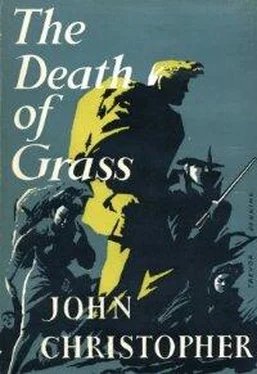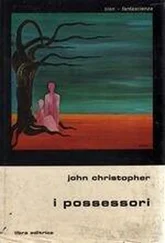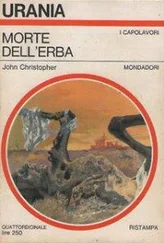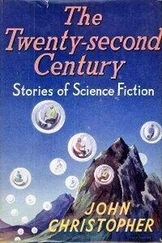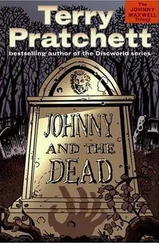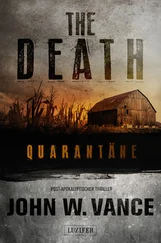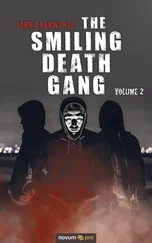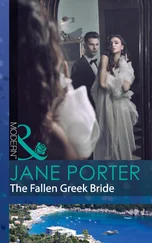The accent was American. John said softly:
“So that beautiful banner yet waves.”
“Numbers of airplanes,” the voice continued, “have been arriving during last evening in parts of the United States and Canada. By the President’s order, the people in them have been given sanctuary. The President of France and senior members of the French Government, and the Dutch and Belgian Royal families are amongst those who have entered this country. It is reported from Halifax, Nova Scotia, that the British Royal family and Government have arrived there safely. According to the same report, the last Prime Minister of Great Britain, Raymond Welling, has said that the startling speed of the breakdown which has taken place there was largely due to the spread of rumours that major population centres were to be atom-bombed as a means of saving the rest of the country. These rumours, Welling claims, were entirely unfounded, but caused panic nevertheless. When told that the Atomic Energy Commission here had reported atomic-bomb explosions as occurring in Europe during the past few hours, Welling stated that he could not account for them, but thought it possible that isolated Air Force elements might have used such desperate measures in the hope of regaining control.”
Roger said: “So it got out of hand, and he threw it up and ran.”
“One of the unsolved mysteries,” John said.
The voice went on: “The following statement, signed by the President, was issued in Washington at nine p.m.
“It is to be expected that this country will mourn the loss to barbarism of Europe, the cradle of our Western civilization. We cannot help being grieved and shocked by what is taking place on the other side of the Atlantic Ocean. At the same time, this does not mean that there is the slightest danger of a similar catastrophe occurring here. Our food-stocks are high, and though it is probable that rations will have to be reduced in the coming months, there will be ample food for all. In the fullness of time, we shall defeat the Chung-Li virus and go out to reclaim the wide world that once we knew. Until then, our duty is to preserve within the limits of our own nation the heritage of man’s greatness.”
John said bitterly: “That’s encouraging, anyway.”
He turned to see Olivia coming down the stairs with the girl. Now that she was dressed, he saw that she was two or three years older than Mary, a country girl, more distinguished by health than good looks. She looked from John’s face to the stains on the floor, and back again; but her face did not show anything.
Olivia said: “This is Jane. She’s coming with us. We’re all ready now, Johnny.”
John said: “Good. Then we’ll push off.”
The girl turned to Olivia. “Before I go—could I see them, just the once?”
Olivia looked uncertain. John thought of the two bodies, crammed in, without ceremony or compunction, beneath the stairs on which the girl now stood.
He said sharply: “No. It wouldn’t do you or them any good, and we haven’t got the time.”
He thought she might protest, but when Olivia urged her forward gently, she came. She looked once round the living-room, and walked out into the open.
“O.K.” John said, “we’re off.”
“One minor item,” Pirrie said. The voice on the radio was still talking, falling towards and away from them on periodic swells of volume. It was outlining some new regulation against food hoarding. Pirrie walked over to the sideboard and, in a single movement, swept the radio on to the wooden floor. It fell with a splintering of glass. With deliberate movements, Pirrie kicked it until the cabinet was shattered and the broken fittings displayed. He put his heel solidly down on to the tangle of glass and metal, and mashed it into ruin. Then, extricating his foot with care, he went out with the rest.
Their journey, owing to the presence of the children, would have to be by fairly easy stages. John had planned for three days; the first march to take them to the end of Wensleydale, the second over the moors to a point north of Sedbergh, and the third, at last, to Blind Gill. It would be necessary to keep close to the main road, and he hoped that for long periods it would be possible to travel on it. He thought it was unlikely there would be any cars about By now, Masham’s example must have been followed in most of the North Riding. The cars would bog down long before they got to the Dale.
Roger said to him, as they made their way down by the side of a wood in me direction of Coverham:
“We could get hold of bicycles. What do you think?”
John shook his head. “We would still be too vulnerable. And we should have to find ten bicycles together—otherwise it would mean having to wheel some along, or else splitting up the party.”
“And you’re not going to do that, are you?” Roger asked.
John glanced at him. “No. I’m not going to do that.”
Roger said: “I’m glad Olivia was able to persuade the girl to come with us. It would have been grim to think of her back there.”
“You’re getting sentimental, Rodge.”
“No.” Roger hitched his pack more firmly on to the middle of his back. “You’re toughening up. It’s a good thing, I suppose.”
“Only suppose?”
“No. You’re right, Johnny. It’s got to be done. We’re going to make it?”
“We’re going to make it.”
The houses they passed were closed and shuttered; if people still lived in them they were giving no external sign of occupancy. They saw fewer people even than would have been normal in these parts; and when they did encounter others, there was no attempt at greeting on either side. For the most part, the people they met gave ground before the little party, and detoured round them. But twice they saw bands similar to their own. The first of these was of five adults, with two small children being carried. The two parties stared at each other briefly from a distance, and went their separate ways.
The second group was bigger than their own. There were about a dozen people in it, all adults, and several guns were in evidence. This encounter happened in the afternoon, a few miles east of Aysgarth. Apparently this group was crossing the road on their way south to Bishopdale. They halted on the road, surveying the approach of John and the others.
John motioned his own group to a stop, about twenty yards away from them. There was a pause of observation. Then one of the men who faced them called:
“Where are ye from?”
John said: “London.”
There was a ripple of hostile interest. Their leader said:
“There’s little enough to be got in these parts for those who live here, without Londoners coming up scavenging.”
John made no reply. He hefted his shot-gun up under his arm, and Roger and Pirrie followed suit They stared at the other group in silence.
“Where are ye making for?” the man asked them.
“We’re going over the moors,” John said, “into Westmorland.”
“There’ll be nought more there than there is here.” His gaze was on the guns, longingly. “If you can use those weapons, we might be willing to have you join up with us.”
“We can use them,” John said. “But we prefer to stay on our own.”
“Safety in numbers these days.” John did not reply. “Safer for the kiddies, and all.”
“We can look after them,” John said.
The man shrugged. He gestured to his followers, and they began to move off the road in their original direction. He himself prepared to follow them. At the road’s edge, he paused, and turned back.
“Hey, mister!” he called. “Any news?”
It was Roger who replied: “None, but that the world’s grown honest.”
The man’s face cracked into a laugh. “Ay, that’s good. Then is doomsday near!”
Читать дальше
